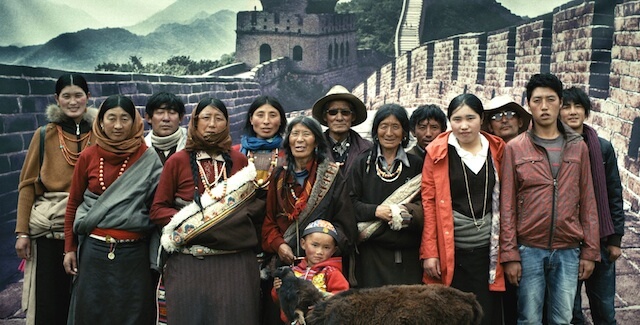Every year, a small chunk of the Academy Awards ceremony is eaten up by 15 films that, to most casual viewers, may be completely obscure. They are the three categories of shorts: live-action, animation and documentary. If you live in a major city, the yearly screenings of these titles — scheduled shortly before the big night, in part to help those who want a leg-up in Oscar pools — have long been popular events. But how are they this year? And does this batch again serve to remind that the shorts wing of the Academy is severely lacking in decent taste? Here’s how this year fares: Live-action: Traditionally, this section has been the Academy’s worst. The live-action committee likes a particular type of short: an overly-earnest, sad, banal mini-film that usually ends with a twist. Only two here end with rug-pulling: “Aya,” in which a lonely-seeming Israeli woman (Sarah Adler) whimsically pretends to be the driver of a Danish music researcher (Ulrich Thomsen) at the airport; and “Boogaloo and Graham,” a boisterous look at two kids living with the Troubles in Belfast. Both find comedy eclipsed by melancholy, even near-tragedy, but only the one in “Aya” doesn’t feel cheap and manipulative. Moreover, “Aya” at least chugs along on the low-key chemistry between its two leads — Adler meek yet quietly eccentric, Thomsen somehow both uptight and friendly. Of the other three, “Parvaneh” offers fun yet predictable night-on-the-town antics between a young Afghan immigrant in a Swiss city and a same-aged rebel, while “The Phone Call” is a grossly rib-nudging weepie about a suicide hotline center saved by the peerless professionalism of its two actors: Sally Hawkins and, heard but not seen, Jim Broadbent. Semi-tolerable is better than usual for this category, but it the overall average goes even higher with the inclusion of “Butter Lamp,” a purely and unusually avant-garde comedy with a single camera set-up, watching as Tibetan nomads sit for faux-vacation pictures in front of fake backdrops. It’s offers people watching along with cryptic commentary — a combo too singular for even AMPAS to ignore. What will win (probably): Probably “The Phone Call”: genuinely great actors classing up a genuinely sad (if questionably tidy) situation.
Animation: Traditionally, this category tends to be more reliable than the live-action does, as animation tends to be more visually striking than boring old reality. But this is a relatively off year, which is to say only sometimes wonderful. There are some eye-catching textures: characters tend to become part of their surroundings in “The Bigger Picture” (concerning an elderly mother’s death) and “The Dam Keeper” (about a sad pig) is all smudgy colors. But both feel distractingly incomplete as narratives, as though more care went into the look than the content. Even the bright spots never burn too bright. A two-minute quickie, “A Single Life” expertly milks a gimmick, then gets out of there. Disney’s “Feast,” shown in front of “Big Hero 6,” cleverly portrays a break-up from the perspective of the dumpee’s eternally ravenous mutt, though, this being Disney, of course it has a happy ending. The closest to a standout is the Canadian “Me and My Moulton,” a remembrance piece that uses animation to track the way memories work. If only more memoirists thought to use the medium — a more engaging form, in ways, than ye olde printed word. What will win (probably): “The Dam Keeper” is just sappy enough to steal the trophy from the more entertaining/accomplished “Feast.”
Documentary: There are a fair amount of feature-length documentaries that would function better as shorts; often times a subject — say, the recent Chinese food doc “The Search for General Tso” — is interesting, but not 90-some minutes interesting. The five here fill out their comparatively brief lengths snugly. And they’re a uniformly grim lot. “Joanna” is about a mom in the last stages of cancer (she passed in 2012), and it’s played as an intimate portrait that plays like home video footage. That goes double for “Our Curse,” which often features its young Polish parents sitting on a couch, tending to wine and cigarettes while wearily discussing their infant son, who suffers from an incurable disease that requires him being almost eternally hooked up to a machine. The subjects aren’t seeking your tears; they just need to vent about a situation that seems surreally cruel. Heading into a slaughterhouse, “The Reaper” is a disquieting profile of a man who kills hundreds of cows a day, but one that favors visuals over simple exposition. “White Earth” explores a barren, once thriving North Dakota town, with narration from a kid that’s reminiscent of Linda Manz’s dazed, barely-aware voiceover in “Days of Heaven.” The longest, at 45 minutes, is “Crisis Hotline: Veterans Press 1,” which holes up at the nation’s only and monstrously busy veteran’s call center, observing as staffers patiently talk former soldiers down from suicide. Sad music is probably not necessary, given how brutal the film is already, but it keeps things admirably simple, watching weary pros deal with the unthinkable. What will win (probably): One doesn’t want to simply pick on topic, as though choosing with horrific subject is the best, but “Crisis Hotline” might be, thanks to the release of “American Sniper,” the timeliest, at least.
Rounding up this year’s Oscar-nominated shorts

Butter Lamp
Follow Matt Prigge on Twitter @mattprigge


















